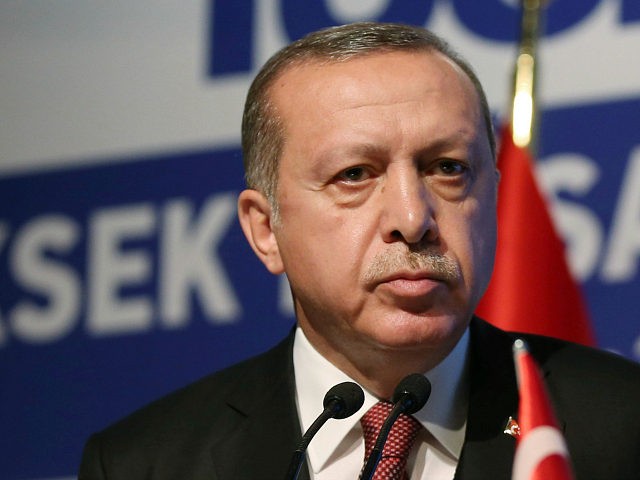The government of Turkey announced Operation Claw-Eagle on Monday, a bombing campaign against Kurdistan Workers’ Party (PKK) in northern Iraq.
The PKK, a U.S.-designated Marxist terrorist organization, established itself in the northern Sinjar region of Iraq largely in response to the 2014 attempt by the Islamic State to commit genocide against the indigenous people of the area, the Yazidi. Radical Muslims consider Yazidis “devil worshippers” due to their belief in and worship of the Peacock Angel, which some consider a manifestation of Lucifer. The PKK entered Sinjar and, locals say, helped fight against ISIS at the height of the human rights atrocities that occurred there. The group has vowed not to evacuate Sinjar until the Yazidis can arm and defend themselves.
Turkey considers all Kurdish groups “terrorists” except for the Kurdistan Regional Government (KRG) of Iraq, which has traditionally had a tense relationship with the PKK. Turkish President Recep Tayyip Erdogan has repeatedly invaded Iraq and Syria on missions to eradicate the PKK and groups such as the Syrian Kurdish People’s Protection Units (YPG/YPJ), who are allied with the United States, but enjoy friendly relations with the PKK.
Operation Claw-Eagle began after Turkey declared victory in its military operation in Libya. Turkey joined the fray in the Libyan Civil War at the beginning of the year, fighting on behalf of the internationally-recognized Government of National Accord (GNA). In doing so, it took sides against renegade general Khalifa Haftar and Russian forces sent to help him succeed in invading the nation’s capital, Tripoli. The GNA announced the full withdrawal of Haftar forces from Turkey last week.
The Turkish Defense Ministry announced Operation Claw-Eagle on Monday along with the news that Turkish airstrike reportedly “destroyed at least 81 targets amid airstrikes against terrorists in northern Iraq,” according to the state-run Anadolu news agency.
“While planning and executing the operation, Turkish forces took great care to protect the lives and property of civilians, as well as the environment,” the Defense Ministry insisted. The operation was allegedly launched on Monday “to ensure the security of the Turkish people and the country’s borders by neutralizing the PKK and other terrorist organizations that have been stepping up harassment and attack attempts against the police and military bases.”
“Our planes are bringing the caves down on the terrorists’ heads,” the Turkish Defense Ministry reportedly tweeted.
Rudaw, a Kurdish news agency based in Iraq, reported that Sinjar, in Nineveh province, was among several areas targeted by airstrikes: “Suspected PKK locations were targeted in Shingal in Nineveh province, and Makhmour, Qarachogh, Mount Qandil, Khuakurk, and Zap across the Kurdistan Region.”
While the Turkish government asserted that it had taken “great care” to protect civilians, PKK news sources stated that the Turks bombed a hospital and refugee camp, according to Rudaw. The refugee camp in question houses Kurdish refugees, many of them who fled into Iraq from Turkey.
Turkey has maintained prolonged police and military presence in Kurdish areas in the south of the country, imposing curfews and arrested local Kurdish politicians for allegedly supporting the PKK.
Rudaw independently verified that an unknown number of children were hospitalized as a result of one of the bombings, but at least one local mayor and another eyewitness in saying that many of the territories targeted indeed did not suffer civilian casualties.
Rudaw reported that the Iraqi defense ministry condemned the airstrikes on Twitter on Monday, but the tweet cited appears to have been deleted at press time.
Turkey regularly targets Sinjar, often without Iraqi government consent, to fight Kurdish and Yazidi forces there. In November, Turkey executed airstrikes targeting positions held by the Shingal [Sinjar] Protection Units (YBS), a Yazidi militia formed after the ISIS invasion of the territory with PKK help.
The Turkish government appears to have temporarily diverted attention from Iraq to focus on Libya this year. In December, Turkey’s parliament – controlled by the ruling Islamist Justice and Development Party (AKP) – voted to approve the use of military force on Libyan soil. While lawmakers insisted the move was “largely symbolic,” by January Turkish military activity in Tripoli had begun. Libya has been in a state of irregular civil war since the overthrow and killing of longtime dictator Muammar Qaddafi in 2011.
Last week, the GNA announced that it had defeated Khalifa Haftar’s Libyan National Army (LNA) with Turkey’s help. The announcement followed reports of hundreds of Russian, Syrian, Emirati and other foreign mercenaries leaving the city.
Reports surfaced in pro-Erdogan Turkish media on Monday that the GNA is negotiating the possibility of Turkey using its military bases in the country for a prolonged period of time.
It is unclear at press time if Khalifa Haftar personally has left Tripoli, or what his plans are in the future. Last week, Venezuelan President Juan Guaidó bizarrely alleged that Haftar had landed in the South American country. He later walked back the claim and said only that Haftar’s airplane had landed in Venezuela. While Haftar and socialist dictator Nicolás Maduro share an ally in Russia, they have no known public ties.

COMMENTS
Please let us know if you're having issues with commenting.